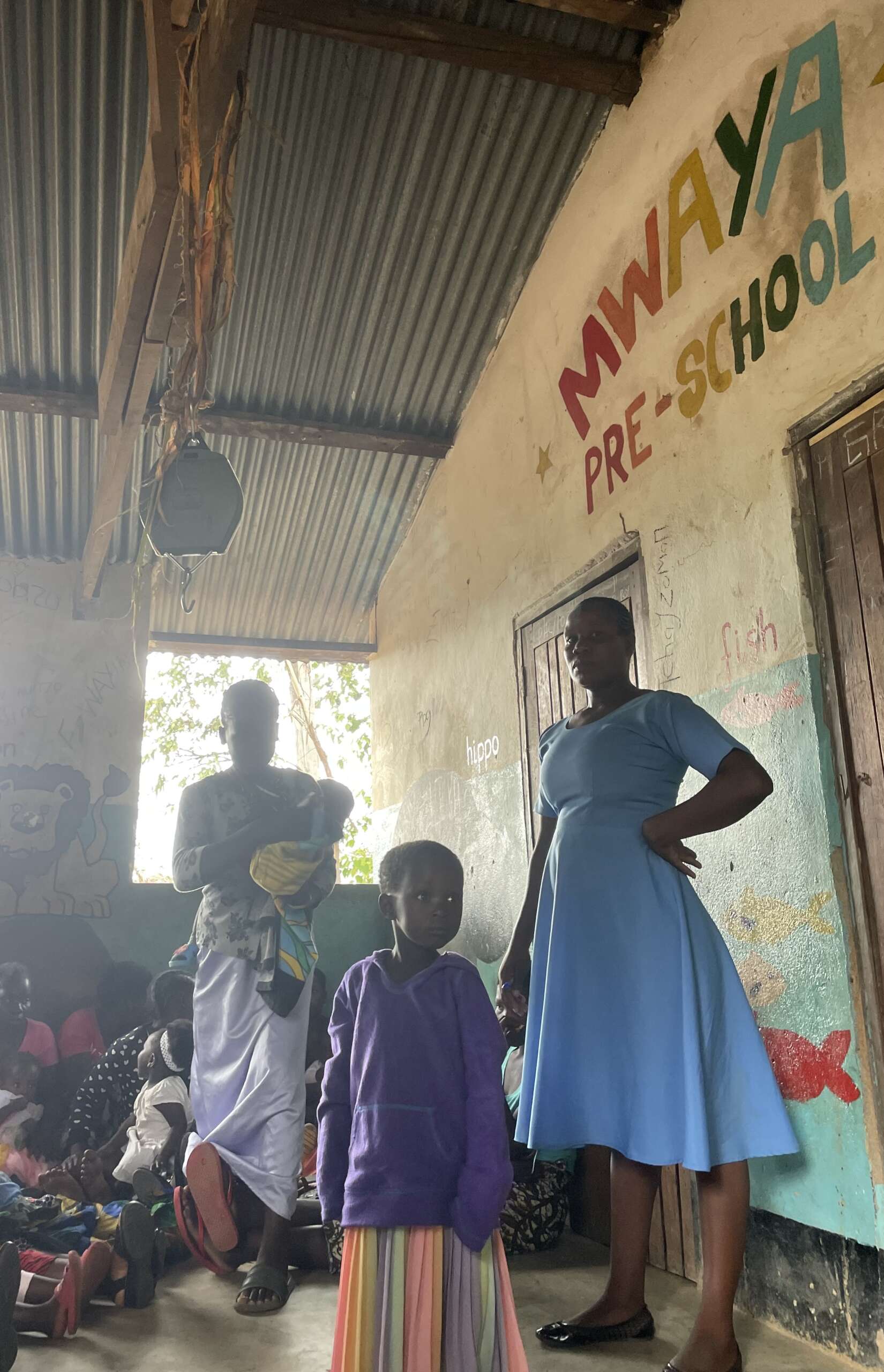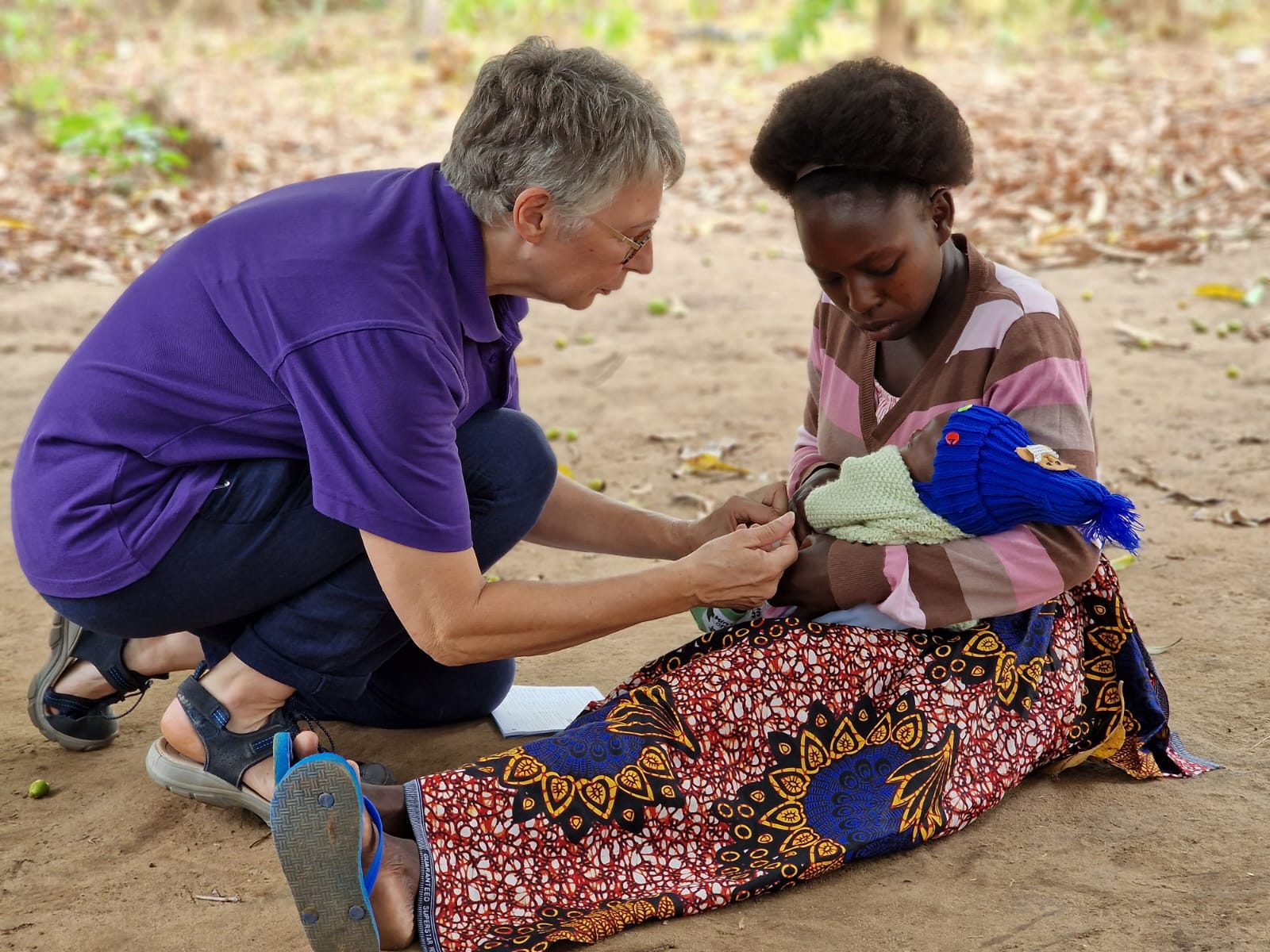One day each week I am heading out into local communities to find out more about children’s health care in Malawi. Around this area there are a network of “under 5s clinics” which offer weight monitoring and vaccination services. These clinics are equivalent to our “well baby” clinics in the UK. I was involved in the provision of children’s health care for many years as part of my work as a nurse practitioner (both well baby clinics and consultations for unwell children), and now offer newborn health examinations and advice to families in the early days of their family life. https://yourmidwife.org.uk/antenatal-postnatal-care/
Here in Malawi, one of the major threats to a child’s life is malnutrition https://www.unicef.org/press-releases/over-half-million-children-risk-malnutrition-malawi. By encouraging mothers (it is always the mothers) to bring their children to a monthly clinic, staff can identify those who need to be reviewed and who may benefit from a supplementary feeding programme. The way babies and children are weighed is rather different to what I am used to. The shear number of children is astonishing- on Friday morning we vaccinated more than 100 babies! A sling balance scale, hung from the rafters by dried banana leaves, suspending the child over a concrete floor makes me think that health and safety might be a good thing after all! Babies are usually wrapped in the chitenge that is used to carry them everywhere, with the hook of the scales threaded through a knot in it. Older children are told to hold the hook and simply hang there.
A sling balance scale, hung from the rafters by dried banana leaves, suspending the child over a concrete floor makes me think that health and safety might be a good thing after all! Babies are usually wrapped in the chitenge that is used to carry them everywhere, with the hook of the scales threaded through a knot in it. Older children are told to hold the hook and simply hang there.
The range of vaccines as a routine part of children’s health care is wider than those offered routinely in the UK. A few families choose not to attend to have their baby vaccinated, and disease outbreaks occur as a result. This week one of my fellow volunteers has seen several people (children and adults) with measles, a condition she is very unlikely to see in her work in the UK because of our high levels of vaccination and the general health and nutritional status of the population. It is easy for us to assume that because we don’t see conditions like this that they have disappeared, or that they are not serious health problems. For many people, infection with measles is indeed a mild and self limiting illness, but for others it can have very serious consequences, including permanent brain damage, sight loss and death. More information here https://www.who.int/news-room/fact-sheets/detail/measles
A vaccine that has recently been added to the routine children’s health care in Malawi is malaria vaccine. Following a pilot study in 2019, the vaccine is now a routine addition here for babies, whilst scientists continue to monitor its effectiveness and study the duration of immunity offered https://www.who.int/news/item/06-10-2021-who-recommends-groundbreaking-malaria-vaccine-for-children-at-risk
Malaria is a huge problem in Malawi. At every hospital and clinic I have visited malaria is by far the biggest single issue causing ill health, and takes the majority of health care workers time (for testing, assessment and care provision). Strategies for reducing malaria prior other than vaccination are the prevention of bites (bed nets and insect repellent), prophylactic use of anti malaria tablets and attempts to reduce the population of mosquitoes (house spraying, draining stagnant water etc). Each of these interventions is challenging. I have a net surrounding my bed, and apply liberal amounts of insect repellent. Even with those I have still been bitten at times. I am fortunate to have been able to afford to buy both insect repellent and anti malaria tablets, but for most of the local population that is not a financial possibility. Pregnant women are given a bed net and advised the importance of protecting them and their babies. Sadly many bed nets are put to an alternative use as a fishing net. Due to the size of the mesh, these nets catch immature fish and so an unintended consequence of adversely impact on fish stock has arisen. This an issue that Ripple Africa have been working to address
https://www.youtube.com/watch?v=LZNNTQyZbG0
I was astonished that at the hospital there are no mosquito nets over the beds. By definition many of the patients in hospital are particularly vulnerable, and it seemed very strange to be telling women about the importance of nets and why they should use one at home, but then in hospital they are not in use. On enquiring about this, I was told that the use of nets in hospital is “not allowed” because they will collect dust and so are an infection risk……Sometimes I don’t know whether to laugh or cry…..I fear that this may be yet another example (I am seeing many) of well meaning visitors from other countries making assumptions and imposing principles and practices that work in their home country, but without fully understanding or full consideration of local issues . It is such a challenging line to tread when we visit a place with such different issues and cultural norms. Unintended consequences of well meant aid or interventions is wasteful of time and resources and can be directly harmful. I will continue to think about this and will, no doubt, write more in the future. In terms of the malaria vaccine, I initially felt excited that I was part of the children’s health care programme to help protect babies from malaria infection. I am however starting to think about the consequences- for the individual of course it is good if severe malaria is prevented, but over time the consequent population increase will have other effects. One of my hopes would be that the amount of healthcare time and resources freed up if malaria is massively reduced can be targeted towards education of the population about the benefits of controlling the population size and providing contraceptive services.


1 Comment
Angie , each one of your blogs gives much for me to think about, The unintended consequences of well meaning actions/research opens up many moral and ethical dilemmas. The more I read about your experiences in Malawi , the more I appreciate our NHS and hope we can secure its future. thanks with love and respect x